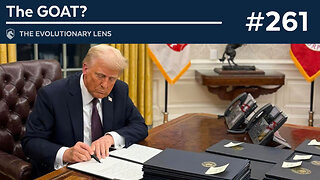Premium Only Content

Episode 2163: My 3 Favorite Popes - Pope Pius 10th - Part 3 of 3
Pope Pius X was born Giuseppe Melchiorre Sarto on June 2, 1835, in the small village of Riese, in the Province of Treviso, which was then part of the Austrian Empire (now Italy). He was the second of ten children in a poor family. His father, Giovanni Battista Sarto, was a postman, and his mother, Margherita Sanson, was a seamstress. Despite their poverty, his parents were dedicated to providing him with a good education.
Priesthood and Early Church Career:
Sarto entered the seminary at Padua and was ordained a priest in 1858. He initially served as a parish priest in Tombolo, where he was noted for his pastoral care and commitment to his parishioners. His abilities led to his appointment as a canon in the cathedral at Treviso, where he also became the spiritual director of the seminary.
In 1884, he was appointed Bishop of Mantua, where he focused on seminary reform, improving the education of the clergy, and addressing social issues. His success in Mantua brought him to the attention of Pope Leo XIII, who appointed him Patriarch of Venice and cardinal in 1893.
Papacy
Giuseppe Sarto was elected pope on August 4, 1903, and took the name Pius X. His papacy lasted until his death in 1914. Pius X is often remembered for his deep personal piety, pastoral care, and his motto "Instaurare omnia in Christo" (To restore all things in Christ).
Reforms and Initiatives:
Liturgical Reforms: Pius X was a strong advocate for the reform of church music, encouraging the return to Gregorian chant and more reverent liturgical practices. He also encouraged more frequent reception of Holy Communion and lowered the age for First Communion to about seven years old.
Canon Law: He initiated the first systematic codification of Canon Law, which culminated in the 1917 Code of Canon Law, although it was completed after his death.
Modernism: Pius X is known for his staunch opposition to Modernism, a movement within the Church that sought to reconcile Catholic doctrine with contemporary philosophical and scientific thought. He issued the encyclical Pascendi dominici gregis in 1907, condemning Modernist doctrines, and required clergy to take an oath against Modernism.
Social Teaching: While not as extensively involved in social issues as his predecessor Leo XIII, Pius X continued to support Catholic social teaching, emphasizing the Church's role in social justice and the importance of lay participation in the Church.
Personal Qualities and Legacy:
Pope Pius X was known for his personal humility, simplicity, and charity. He often visited hospitals and schools, and he made a point of being accessible to the faithful. Despite his strict stance against Modernism, he was beloved by many for his genuine pastoral concern and holiness.
He was canonized a saint by Pope Pius XII in 1954, making him the first pope since Pius V to be declared a saint. His feast day is celebrated on August 21.
Death
Pius X died on August 20, 1914, shortly after the outbreak of World War I. His death marked the end of an era in the Catholic Church, as his successor, Pope Benedict XV, would lead the Church through the challenging war years.
Pope Pius X is remembered for his piety, pastoral care, and significant contributions to church reform and canon law. His legacy continues to influence the Catholic Church today.
-
 1:36:09
1:36:09
Benny Johnson
3 hours ago🚨WATCH: President Trump Declassifies JFK, RFK, MLK Files LIVE Right Now in Oval Office, History Now
70.5K100 -
 LIVE
LIVE
BlackDiamondGunsandGear
5 hours agoLIVE SHOT SHOW 2025 COVERAGE w/ DLD After Dark
329 watching -
 2:36:32
2:36:32
Omar Elattar
2 hours agoEx-Arms Dealer: "How I Won A $300M Pentagon Contract At 24 & Inspired War Dogs"
5 -
 LIVE
LIVE
Game On!
1 hour agoPUMP THE BRAKES! Patrick Mahomes will NEVER be Tom Brady!
110 watching -
 1:04:14
1:04:14
In The Litter Box w/ Jewels & Catturd
22 hours agoBorder Is Closed | In the Litter Box w/ Jewels & Catturd – Ep. 726 – 1/23/2025
46.9K16 -
 1:41:52
1:41:52
The Quartering
5 hours agoDemonic Visitors, ICE Raids Begin, Brett Cooper Drama, Trump Vs Woke Bank, MSM Helping Illegals!
75.3K24 -
 1:53:38
1:53:38
Barry Cunningham
3 hours agoWATCH LIVE: TRUMP DAILY BRIEFING - PETE HEGSETH CONFIRMATION & NEW OTDERS BY PRESIDENT TRUMP
42K14 -
 1:08:57
1:08:57
Bare Knuckle Fighting Championship
22 hours agoBKFC KNUCKLEMANIA V PHILADELPHIA PRESS CONFERENCE | LIVE!
39K3 -
 2:11:55
2:11:55
vivafrei
7 hours agoTrump is Making Some BAD Decisions! More mRNA "Vaccine" Tyranny? Jan. 6 Release UPDATES! & More!
65.3K163 -
 2:17:45
2:17:45
Darkhorse Podcast
5 hours agoThe GOAT? The 261st Evolutionary Lens with Bret Weinstein and Heather Heying
42.1K27